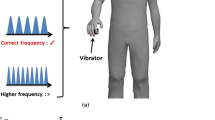Abstract
Mutual awareness between users working in collaborative virtual environments is an important factor for efficient collaborations. Several studies have reported that haptic feedback improves performance in collaborative tasks. However, few researches have tried to evaluate the influence of haptic feedback on mutual awareness, and to link the corresponding measures with the performance and efficiency factors. In the context of collaborative 3D polygonal modelling, we present a collaborative interaction method that dynamically adjust the selection area of the different involved partners. The aim of this interaction method is to improve the efficiency of collaborative working by improving the partners’ mutual awareness. The experimental evaluation compares the proposed collaborative method of selection with a standard and individual method of selection used in most polygonal modelling software. The experimental results show an improvement in working efficiency and a better work distribution between the partners. Moreover, the analysis of awareness measure shows that the proposed approach balances self awareness and mutual awareness.
Access this chapter
Tax calculation will be finalised at checkout
Purchases are for personal use only
Preview
Unable to display preview. Download preview PDF.
Similar content being viewed by others
References
Endsley, M., Garland, D.J.: Theoretical underpinnings of situation awareness: A critical review. In: Situation Awareness Analysis and Measurement, pp. 3–32. Lawrence Erlbaum Associates, Mahwah (2000)
Blaskovich, J.L.: Exploring the effect of distance: An experimental investigation of virtual collaboration, social loafing, and group decisions. Journal of Information Systems 22(1), 27–46 (2008)
Sallnäs, E.L., Rassmus-Gröhn, K., Sjöström, C.: Supporting presence in collaborative environments by haptic force feedback. ACM Transactions on Computer-Human Interaction 7(4), 461–476 (2000)
Basdogan, C., Ho, C.H., Srinivasan, M.A., Slater, M.: An experimental study on the role of touch in shared virtual environments. ACM Transactions on Computer-Human Interaction 7(4), 443–460 (2000)
Groten, R., Feth, D., Peer, A., Buss, M., Klatzky, R.: Efficiency analysis in a collaborative task with reciprocal haptic feedback. In: Proceedings of the 2009 IEEE/RSJ International Conference on Intelligent Robots and Systems, pp. 461–466. IEEE, St. Louis (2009)
Oakley, I., Brewster, S., Gray, P.: Can You Feel the Force? An Investigation of Haptic Collaboration in Shared Editors. In: The Proceedings of EuroHaptics, pp. 54–59 (2001)
Girard, A., Ammi, M., Simard, J., Auvray, M.: Improvement of collaborative selection in 3D complex environments. In: 2012 IEEE Haptics Symposium, Vancouver, British Columbia, Canada, pp. 281–288 (2012)
Ullah, S.: Multi-modal Assistance for Collaborative 3D Interaction: Study and analysis of performance in collaborative work. PhD thesis, Université d’Evry-Val d’Essonne (2011)
Nova, N., Wehrle, T., Goslin, J., Bourquin, Y., Dillenbourg, P.: Collaboration in a multi-user game: impacts of an awareness tool on mutual modeling. Multimedia Tools and Applications 32(2), 161–183 (2006)
Girard, A., Bellik, Y., Auvray, M., Ammi, M.: Collaborative approach for dynamic adjustment of selection areas in polygonal modelling. In: Proceedings of the 18th ACM Symposium on Virtual Reality Software and Technology, VRST 2012, pp. 205–206. ACM, New York (2012)
Bolstad, C., Cuevas, H., Gonzalez, C., Schneider, M.: Modeling shared situation awareness. In: Proceedings of the 14th Conference on Behavior Representation in Modeling and Simulation (BRIMS), Los Angeles (2005)
Chastine, J.W., Brooks, J.C., Zhu, Y., Owen, G.S., Harrison, R.W., Weber, I.T.: AMMP-Vis: A Collaborative Virtual Environment for Molecular Modeling. In: ACM Symposium on Virtual Reality Software and Technology, pp. 8–15 (2005)
Gunn, C.: Collaborative virtual sculpting with haptic feedback. Virtual Reality 10(2), 73–83 (2006)
Nam, T.J., Wright, D.: The development and evaluation of syco3d: a real-time collaborative 3d cad system. Design Studies 22(6), 557–582 (2001)
Author information
Authors and Affiliations
Editor information
Editors and Affiliations
Rights and permissions
Copyright information
© 2013 Springer-Verlag Berlin Heidelberg
About this paper
Cite this paper
Girard, A., Bellik, Y., Auvray, M., Ammi, M. (2013). Visuo-haptic Tool for Collaborative Adjustment of Selections. In: Oakley, I., Brewster, S. (eds) Haptic and Audio Interaction Design. HAID 2013. Lecture Notes in Computer Science, vol 7989. Springer, Berlin, Heidelberg. https://doi.org/10.1007/978-3-642-41068-0_5
Download citation
DOI: https://doi.org/10.1007/978-3-642-41068-0_5
Publisher Name: Springer, Berlin, Heidelberg
Print ISBN: 978-3-642-41067-3
Online ISBN: 978-3-642-41068-0
eBook Packages: Computer ScienceComputer Science (R0)




